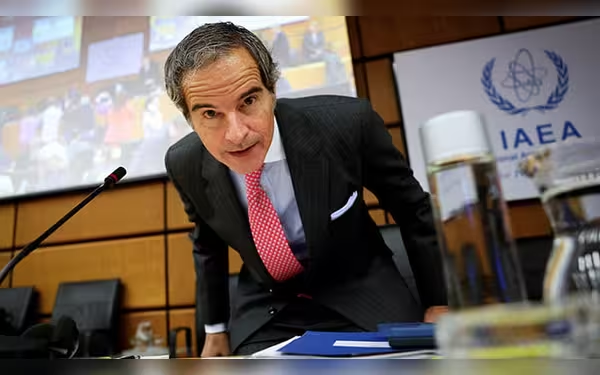Sunday, December 22, 2024 02:16 PM
IAEA Resolution Urges Iran to Renew Nuclear Negotiations
- IAEA urges Iran to enhance nuclear cooperation.
- Iran dismisses uranium stockpile offer as insincere.
- 19 countries support resolution amid divided international stance.
 Image Credits: geo
Image Credits: geoIAEA's resolution calls for Iran to enhance cooperation amid ongoing nuclear concerns and divided international support.
In a significant development regarding global nuclear diplomacy, the Board of Governors of the International Atomic Energy Agency (IAEA) convened in Vienna on November 22, 2024, to address ongoing concerns about Iran's nuclear program. This meeting, which included representatives from 35 member nations, culminated in the adoption of a resolution urging Iran to enhance its cooperation with the IAEA. The resolution aims to pave the way for renewed negotiations concerning Iran's nuclear activities, which have been a point of contention for years.
The resolution, proposed by Britain, France, Germany, and the United States, was met with skepticism from Iranian officials. They dismissed a last-minute offer from Iran to limit its stockpile of uranium, which is nearing weapons-grade levels, as insufficient and insincere. Diplomats noted that Iran's willingness to cap its uranium stock was contingent upon the withdrawal of the resolution, highlighting the delicate balance of negotiations.
Historically, Iran has reacted strongly to such resolutions, often escalating its nuclear activities in response. The IAEA has faced challenges in monitoring Iran's nuclear program, particularly regarding unexplained traces of uranium found at undeclared sites and restrictions placed on its inspection team. The recent resolution reiterated the urgency for Iran to clarify these issues and allow the IAEA to conduct necessary sampling.
In a vote that reflected the divided international stance on Iran, 19 countries supported the resolution, while 12 abstained, and three nations—China, Russia, and Burkina Faso—voted against it. This division underscores the complexities of international relations surrounding nuclear non-proliferation.
Western powers are hopeful that the IAEA's upcoming report, expected by spring 2025, will exert pressure on Iran to engage in negotiations aimed at establishing new restrictions on its nuclear activities. However, the situation remains precarious, especially with the potential return of former President Donald Trump to office in January 2025. Trump's previous withdrawal from the 2015 nuclear deal has left many questioning whether new negotiations will be feasible.
During a recent visit to Tehran, IAEA chief Rafael Grossi sought to persuade Iranian President Masoud Pezeshkian to improve cooperation with the agency. Grossi reported that discussions included the possibility of Iran not expanding its stockpile of uranium enriched to 60% U-235, a level close to weapons-grade. While Iran has enough enriched material for several nuclear weapons, it continues to deny any intentions of developing nuclear arms.
In a notable response to the IAEA's actions, Iranian state media reported that Iran's nuclear chief, Mohammad Eslami, has ordered the activation of advanced centrifuges, which are crucial for uranium enrichment. This move indicates that Iran may escalate its nuclear activities in response to the resolution, as suggested by a senior diplomat prior to the vote.
As the international community watches closely, the path forward remains uncertain. The IAEA's resolution serves as a reminder of the ongoing challenges in nuclear diplomacy and the need for constructive dialogue. The stakes are high, not only for Iran but for global security as well. The coming months will be critical in determining whether diplomatic efforts can yield a peaceful resolution to the nuclear impasse.













